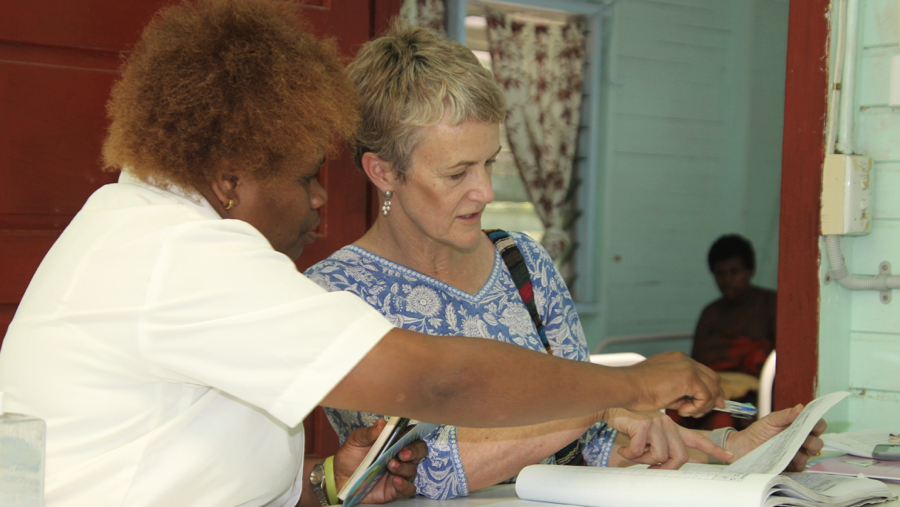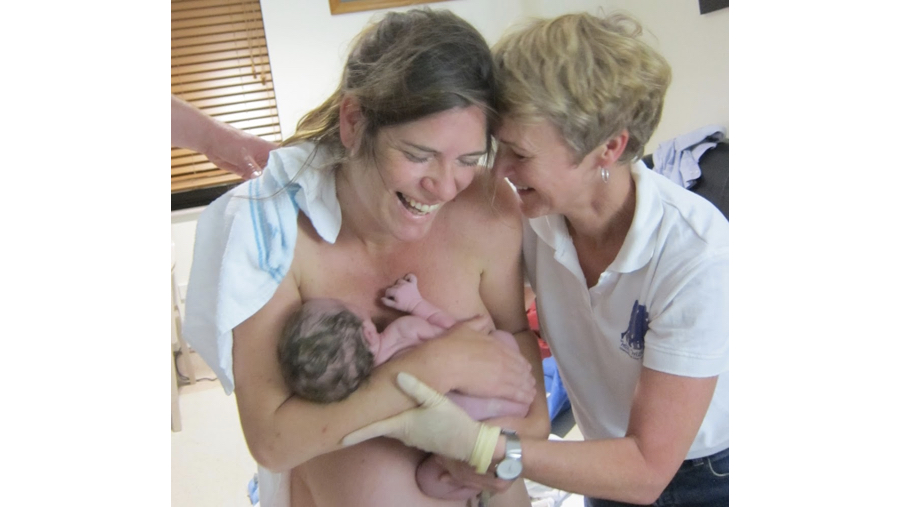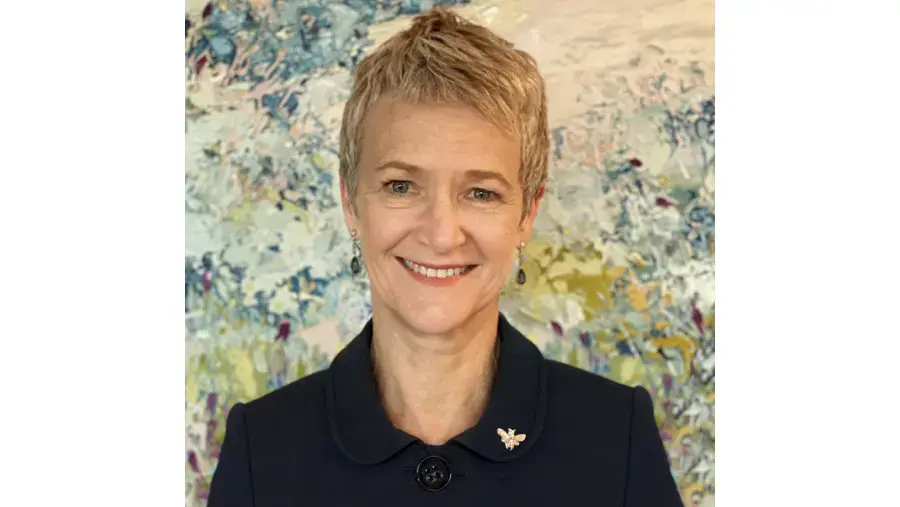“Midwives in every country are critical”
“Midwives in every country are critical”
Caroline Homer is Co-Program Director of Maternal, Child and Adolescent Health and Co-Head for the Women’s and Newborn’s Health Working Group at the Burnet Institute in Melbourne. She is also the Visiting Distinguished Professor of Midwifery at the University of Technology Sydney, Australia.
“Midwives in every country are critical,” says Professor Caroline Homer. ”The world does not have enough midwives, and where they do have enough midwives, they're probably not in the right places. There are just not enough midwives in the places where women and babies need them the most.”
Prof. Homer is one of the authors of the State of the World's Midwifery Report published by UNFPA, WHO and the International Confederation of Midwives (ICM). She says midwives need greater support in training and resources to be more effective.
“We need better systems to support midwives to be their best,” she says. “It's not enough just to have lots of training. It's not enough just to send a midwife out to every village and have midwives everywhere. They are not going to be able to make a difference unless they have access to a telephone and access to a vehicle. They must have access to a hospital up the road to transfer women in emergencies.”
“We need better systems to support
midwives to be their best.”
Prof. Homer says more regulation from the government is essential.
“Regulation is what the country says a midwife should do and how they should monitor for public safety and public benefits,” she says. “In many countries the regulation of midwives is inadequate so you can't be confident of the safety of the care that's provided unless you have strong regulations.”
Prof. Homer also points out that midwifery is under-funded because of patriarchal systems.
“Health systems like many other systems are gender-biased,” she explains. “If you've got a profession that is predominantly women looking after women, it is easy to be invisible.”
“If you've got a profession that is predominantly women looking after women, it is easy to be invisible.”
She believes this deeply entrenched system can change.
“In the report we underscore the importance of gender and what we call gender transformative work environments,” she says. “It is rethinking the power dynamics and the gender issues in health care.”
It's critical to get more women in leadership roles so more resources can be devoted to midwifery.
“Health systems are hierarchical and midwives have not historically been in leadership positions at the top of that hierarchy,” she says. “Midwives, and to some degree nurses, have been down the hierarchy, not seen as worthy of investments.”

However, data is increasingly having an impact in convincing decision-makers.
“We now have a lot more evidence to show that midwives make a difference,” she says. “We are showing differences and shifts in the data and it is encouraging to see countries responding. For example, there’s been real commitment in India towards developing a cadre that is a midwife who is educated according to international standards. We know it will make a difference. ”
Prof. Homer also shares the challenge of some donors being reluctant to fund midwifery initiatives because they see midwifery as often lacking the technological solutions found in other areas or disciplines.
“It's not a new drug, it's not a new technology, it's not a new thing: it's women sitting with women, supporting them, being with women.”
“We have a society that's quite keen on the technical fix, and midwifery is not a technical fix,” she says, “It's not a new drug, it's not a new technology, it's not a new thing: it's women sitting with women, supporting them, being with women.”
She says this obsession with technological innovations has sometimes left midwifery initiatives overlooked.
“It's much easier to invest in a new tablet or a new intervention that's more technical than that of women-supporting-women, which is what midwifery ends up coming down to.”
Prof. Homer admits that the inadequate training that some midwives have received has created a distorted view of what midwifery can and should do.
“The public image of midwives in some countries has not been very positive and so there's not been a demand for them,” she says, believing that better education would improve the perception of midwives. “If you educate midwives properly, and they get a quality education that meets global standards, they can provide more than 80% of the things that mothers and babies need.”
Prof. Homer says that midwives strengthen their capacity, and are afforded the respect they deserve, they are increasingly involved in helping women with a diverse range of support.
“Midwives are at the forefront of providing social and emotional support to ensure that women having a baby can get access to essential services, even if there's a pandemic.”
“Midwives are at the forefront of providing social and emotional support to ensure that women having a baby can get access to essential services, even if there's a pandemic.”
She says the data indicates that more mothers and babies will die from the indirect effects of COVID-19 than dying of the virus because services were interrupted and many midwives got redeployed - including in the early phase of the crisis - and services were stopped.
The pandemic has transformed the way midwives are educated as well.
“COVID-19 has made us rethink how to deliver midwifery education across the region. I don't think we ever would have been brave enough to do it if we hadn't had to do it.”
“COVID-19 has made us rethink how to deliver midwifery education across the region,” she says. “I don't think we ever would have been brave enough to do it if we hadn't had to do it.”
The original train-the-trainers model for the Midwifery Faculty Development Program led by UNFPA with the Burnet Institute has been adapted because of the pandemic and as of May 2021 the course has been disseminated online to over 150 participants from 16 countries.
“It is really exciting and heartening that you can deliver this support at a distance and at scale,” she says. “The midwife educators were in their own countries thinking they were the only people having these challenges. But they come online and see that 22 other countries are grappling with exactly the same problems.”
Beyond the delivery of the curriculum, Prof. Homer says it has also fostered a sense of solidarity among the participants.
“The midwifery faculty are all dealing with the same issues. It's been a positive and powerful example of how you can bring people together.”
“That's been really important to enable a community of practice,” she says. “The midwifery faculty are all dealing with the same issues. It's been a positive and powerful example of how you can bring people together.”
Increasing the quality and scale of midwife education will save lives.
“If midwives are able to roll out family planning services this will make a difference to reducing maternal deaths, reducing newborn deaths and reducing stillbirths,” Prof. Homer says. “We know that many women around the world don't have access to family planning, when and how they need it. If midwives are confident and competent to deliver that service, it will make an enormous difference.”
Expanding everyone’s understanding of what midwives do is part of the process.
“We know that midwives are an important point of contact in the community,” she says. “In many countries there is a midwife in the village who is the contact in the community for family planning, but there are also other issues like safe abortion care and screening for sexually transmitted infections.”
Prof. Homer says mental health support and gender-based violence support are also areas where midwives play a key role.
“Mental health around the period of giving birth but also mental health around violence or intimate partner violence,” she says. “Midwives cannot solve gender-based violence or intimate partner violence but they are screening for it. They're asking women whether they're experiencing violence and then helping women get access to other support.”
She says healthcare systems can, and should, do more to build on the close relationships midwives share with their patients.
“Women are probably more likely to use the midwife as the conduit to other services because of that trust and relationship that gets fostered from the childbirth experience.”
“It may be that they don't deliver all those services themselves, but they work within a team to ensure that women can access all those services,” she says. “Women are probably more likely to use the midwife as the conduit to other services because of that trust and relationship that gets fostered from the childbirth experience.”
While midwives' mandates are expanding as the healthcare system looks to better use their skills, Prof. Homer notes there are still gaps in the data about the outcomes of midwives' support.
“There just isn't enough research or documented experience around the role of midwives,” she says. “As we emerge from the pandemic, we will be recommending midwives be seen as an essential part of disaster response interventions. Midwives must be included alongside all the other disaster response personnel, so the care for mothers and babies and sexual reproductive healthcare continues.”
As Prof. Homer underscores, the pandemic has made this point more clear than ever.
“Women still have babies during a disaster, women still need family planning services during a disaster,” she says. “Things like intimate partner violence go up during a disaster because of the increased stress that the community is under. Sexually transmitted infections go up because of displacement. Midwives absolutely have to be in there wherever mothers and babies are."
When many countries went into lockdown during the pandemic, midwifery was not considered an essential service, so many women were left without support. Prof .Homer says this has to change.
“Midwives must be at every leadership table,” she emphasizes. “What happened in many countries and other places was people got infectious disease experts around the leadership table and forgot about the essential services, particularly for pregnant women.”
“Midwives must be at every leadership table.”
Caroline says she hopes the increased profile and professionalism of midwives within their own government health systems will help ensure that they are included in disaster preparedness plans. She says the data is now showing the tragic consequences of leaving them out.
“We need to have a clear pandemic preparedness plan for maternal and newborn health, sexual and reproductive health services,” she says. “We're seeing the impacts of increased deaths because we didn't put them as essential services right at the beginning.”

Learn more


